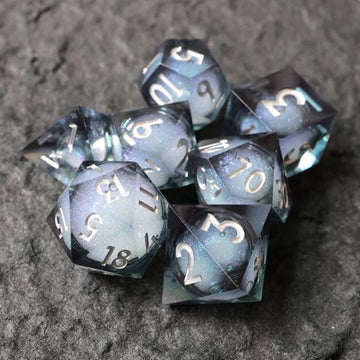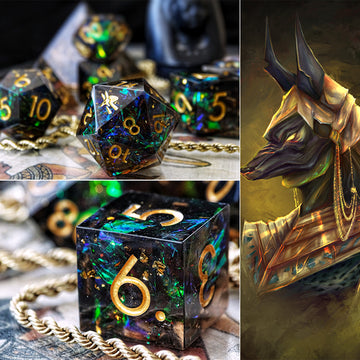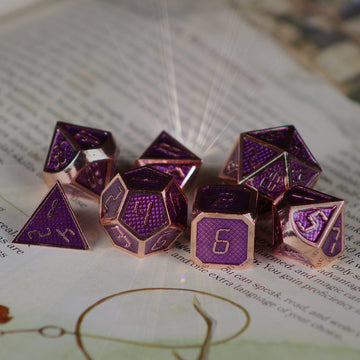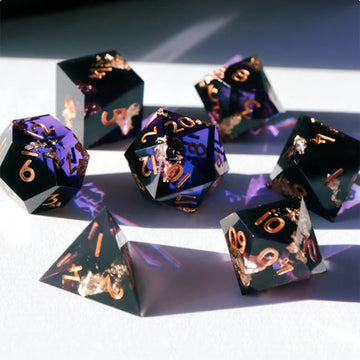Title image © Grant Griffin for Critical Core
How to Run Better DND Skill Challenges
Consistent Problems and Common Solutions to the Famous Mechanic
Table of Contents:
- Origins of Skill Challenges in D&D 4th Edition (And Their Purpose)
- How Does a DnD 5e Skill Challenge Work?
- Common Problems With DnD Skill Challenges
- Attempted Solutions to Improve DnD Skill Challenges
- Conclusion
I love skill challenges.
Probably not a shocking statement from someone who has written 10+ blog posts about the exploration pillar of D&D 5th edition.
I like their flexibility. I like how cinematic they can be. And I like hearing the creative solutions players come up with.
But I'll be the first to admit:
- One reason I like them is because 9/10 times I am the DM, and I play pretty fast a loose with the rules...
- A lot of times DnD skill challenges do not break down that way...
For many people, DnD skill challenges downright SUCK.
"They are boring..."
"A tedious exercise..."
"A predictable waste of time..."
Many feel they exist only because we are playing a game and are not an improv troop. And because it is a game, we need rules. In this case, we need to incorporate some sort of mechanics and dice.
And while there is some truth to this complaint, like many things in life, I believe the ultimate responsibility lies in "user error."
We (myself included) do not know the best way to run a DnD skill challenge.
This blog post is designed to help you understand what a dnd skill challenge is, how it usually falls short of expectation, and some ways to make it better. Its goal is simple: to give you the understanding and tools to run better skill challenges in your DnD 5e campaigns.
Yay :)

© Rostyslav Zagronov
Origins of Skill Challenges in D&D 4th Edition (And Their Purpose)
Though very common in modern TTRPG campaigns, the skill challenge was not always a part of the Dnd experience. They were first introduced in the much-maligned 4th edition of Dungeons & Dragons. While we cannot get in the heads of the game designers... DMDave explains the design goals of 4e skill challenges well:
- "To give non-combat parts of the game the same mechanical rigor as the fights..."
- "To make the DM's role undemanding..."
- "To avoid frustrating players who struggled to overcome an obstacle with a 'correct' answer..."
I would describe the telos/goal/purpose of a skill challenge as follows:
- A focus on teamwork rather than individual performance.
- Offering exciting, surprising complications for players to respond to.
- The need for a mechanic that allows for complex encounters that do not fit within the combat encounter structure.
- Room for failure on a check without catastrophic consequences.
- A reason to encourage the creative use of diverse skills rather than relying on the same ones over and over.
Long story short, skill challenges are a good way to provide structured mechanics to the social and exploration pillars of the game (source).
"Are skill challenges expected to return in upcoming editions?"
Yes. Duh. Why would they go away? Everyone uses them. The only way they go away is if D&D 6e, 7e, and 33e all get way more complicated. And no, don't worry, dear reader, I am aware this is a DUMB question. But apparently, AI search engines REALLY want to know the answer to questions like this. So take it up with Sam Altman.

© Jedd Chevrier for WOTC
How Does a DnD 5e Skill Challenge Work?
A skill challenge is a series of interrelated "tasks" or "obstacles." These tasks are each a unified part of some complex, multilayered threat. These tasks are resolved by the use of character ability checks, which is a single roll of skills against a DC set by the Dungeon Master.
For each task, players have to select a reasonable skill they would use to overcome that challenge. Most tables have a general rule that players cannot repeat the same skill twice in a row, or have to pick a different skill for every task in the skill challenge.
For example, let's say the party is running away from a pack of wolves. The DM decides neither a chase or combat encounter would be appropriate for the story or encounter, so they elect to have a skill challenge instead. One of the "tasks" might involve overcoming a fallen tree that is blocking the road. In this instance, some players may elect to perform:
- An Athletics check to jump over it
- An Acrobatics check to spin through the branches
- A Nature check to run through a rotting part of it
- A Perception check to see if there is a route around it
- An Arcana check to use some sort of magic to disintegrate it
- An Animal Handling check to tame the wolves
- A Stealth check to hide in the fallen tree.
The DM decides ahead of time how many "tasks" the players will perform (usually something like 10, 7, or 5) and the number of successes needed to succeed and "win" the skill challenge (usually 1, 2, or 3 less than the total). They will also decide whether or not each task is successfully accomplished as a group or as an individual:
To continue with the above example, a "group skill challenge" would mean that even if two players failed their Acrobatics and Perception checks, the task is considered a pass/success because the players who rolled Athletics, Nature, and Arcana (the majority) all succeeded. This is the most common way to run a dnd skill challenge.
An "individual skill challenge" is a bit trickier. In this case, each player character must personally roll enough successes in order to pass. If a single PC fails enough tasks to fail the overall skill challenge, then either A) the whole group fails the skill challenge and suffers the consequences, or B) only the one player fails and suffers the consequences.
Notably, a failed skill challenge does not result in player deaths; death is not an appropriate consequence for a party failing a skill challenge. Why? The nature of the skill challenge severely limits the agency of the players, which would make a character's death feel infuriatingly unfair.
You Should Buy More Dice
Yes, We Are Biased
But These 7-Dice Sets Are So NICE

© Jedd Chevrier for WOTC
Common Problems With DnD Skill Challenges
Before I list a bunch of problems, I want to be clear that many of these issues are not the fault of 5e's mechanics. Rather, they are consequences of shortcomings in the skill of players and DMs. That sounds SUPER harsh, but it's the truth. And maybe that is a problem.
1. Unclear Objectives: Before the players can choose what to do, they need to know why they do it. Too many DM's forget to communicate a strong, clear objective. Without it, players have no context regarding the stakes or problem they need to solve.
2. It Feels Like a Checklist: If there isn't proper narration, by both players and DMs, then skill challenges can feel more like a checklist instead of an exciting game. Just players making roll after roll and DMs telling them how many failures they have left. This is a far cry from the immersive role-playing in social encounters and strategic critical thinking in combat encounters.
3. Skill Use Restrictions: I wasn't aware of this until I started researching this post, but the "established/accepted" rules for skill challenges state that players A) use the same skill in a challenge and B) no two players can use the same skill for a single obstacle!!! That is CRAZY restrictive. There are too many obstacles where the ONLY "solution" is to make an athletics check. And if your table has 4+ players, the odds of overlap are very, very high. It guarantees either ridiculous justifications for other skills or downright failure.
4. Over-Reliance on Single Skills: But as flawed as that is, that "can't use the same skill twice" rule is important. Because if the stakes are even remotely high, then players are incentivized to use the skill most likely to succeed... which means they will only use the skills they are good at rather than find a creative, different way. This is the opposite of creative thinking and instead will make skill challenges feel repetitive and redundant.
5. Unplanned Skill Challenges: When DMs have time to thoughtfully consider a skill challenge, they are often great. Each obstacle is unique in its own right, and has room for each character to overcome in their own unique way. But when the players suddenly and unexpectedly fund themselves in a skill-challenge-worthy situation, many DMs are not up to the challenge. They present basic obstacles that A) are similar to one another and B) only have one solution, which REALLY frustrates players.
6. Getting the DC Wrong: When DMs set challenge DCs too high, players feel helpless after several failed rolls and check out. Conversely, overly simplistic challenges may lead to boredom and disengagement, failing to invoke excitement. And threading that needle can be really difficult for DMs.
7. Pass/Fail can be Severe: A big problem with DnD 5e skill checks is that they are all rolled with a d20... the most volatile die in a 7-dice set. Which is fine... unless anything rolled below the DC is equivalent to a nat 1. Without degrees of failure, a little bad luck can overwhelm player agency and DM design.
Finally, and technically, Skill Challenges shouldn't even EXIST
This is just me giving a shout-out to the G.O.A.T. TTRPG blogger, Angry GM. In this post, he argues (quite well) that the reason no one can fix skill challenges is because they are NOT challenges... they are puzzles. And because they are puzzles, they have "right answers." A challenge is a problem, and a problem does not have a "right answer," which frees DMs to simply describe and encourage players to immerse themselves in the situation and approach the problem creatively. But to remove that mechanical problem is to do away with skill challenges altogether.
For Reals... Look at These DnD Dice
Like So So So So So So So GOOD
Shop Now
Attempted Solutions to Improve 5e Skill Challenges
As stated above, there are some problems inherent to DnD skill challenges. Which means there is no single, all-in-one solution that makes them perfect for everybody. To make them better, you have to pick and choose the solutions that fit best for your campaigns, players, and tables. Below are some common solutions scoured from across the interwebs:
Clear Stakes
First of all, you need players to care. And to make them care, you need to tell them the consequences they will suffer should they fail. Outlining distinct success and failure outcomes solidifies the risks involved, making the challenges feel consequential.
Set and Reset the Scene
Furthermore, a DnD skill challenge lives and dies based on how the DM describes the scene. By establishing a vivid environment, players can visualize the situation and better engage their characters' abilities. Incorporating narrative elements such as NPC reactions or shifting conditions can inspire creative problem-solving among participants. Without these evocative, detailed, exciting descriptions, it really IS just a checklist; DM asks for a roll, players roll, players count failures and successes.
"No Risk, No Roll"
Rather than demand each player roll for every obstacle, only have them roll if there is a risk of failing. For example, if the obstacle is: "A tree falls down in front of you as you are running, what do you do to overcome it?" then maybe don't force the barbarian to roll an Athletics check; they are going to leap over the tree no problem. But the feeble Bard? They need to come up with a method that would allow them to continue to run at full speed. The barbarian automatically succeeds, but the Bard has to make a skill check.
Clarify Spellcasting's Place
As far as I know, there are no official rules for using spells in place of skills to overcome the obstacles in a skill challenge. A player can make an Arcana check and just describe any relevant spell, but it still wouldn't consume spell slots. Some tables allow for spells to be used, and given that some spells seem geared specifically for encounters that occur in skill challenges instead of combat, this makes sense. On the other hand, it is yet another way that casting classes are more powerful than martial classes. To mitigate this advantage, some tables require casters both succeed an Arcana check AND use a spell slot, while others require that the spellcaster consume double the number of spell slots to avoid making a skill check.
Progressive Failures
This is a suggestion I found on Optional Rule:
"The core game principle is fairly simple, wherever possible the DM can create more tension in a game by progressing the tension with failed skill rolls. I think in these cases a rule of three model would seem to work. Simply, that is:
- 1st Failure: No progress
- 2nd Failure: Unable to advance without help or change
- 3rd Failure: Consequences"
I like it. It increases tension and forces more collaboration. Speaking of which...
Allow Player Collaboration
For every 5e skill challenge, there tends to be certain character classes that have an easier time succeeding, while others are prone to fail. Sometimes I allow players to sacrifice their character's own success in order to guarantee the success of another character. Cooperative gameplay tends to lead to better cooperative storytelling. Like with the skills, players need to justify how they help and what skill they use to do it.
Have Only One Player Character Act Per Obstacle
This is my personal favorite, though it only works for certain skill challenges. Instead of having all the players roll a skill check or doing a group check, each task/obstacle is rolled by a single player. In this method, you would announce the obstacle and a single character would volunteer to roll. This individual's success/failure would determine the success/failure for the entire group. This method accomplishes a few things:
- Rather than setting up players to fail, you set them up to succeed. The strengths of certain characters shine and they get to feel heroic.
- It makes it easier for DMs, as players have to evocatively describe the situation and how the succeed/fail.
- It removes agency, but it is much more cooperative.
- There is less rolling, so there is less tedious "bookkeeping."
- It makes the challenge WAY more tense, as the fate of each player hangs on the rolls of their allies.
Different DC for Different Obstacles
Apart from simplicity for the DM's sake, I have no idea why each obstacle has to be the same DC. If the skill challenge is at a carnival, I don't see why "win a contest" and "distract the crowd" would be the same DC. In fact, there should be a different DC for each player depending on the skill they choose! This makes it more complicated, and maybe takes more time, but it certainly makes it more exciting!
"What do skill challenges offer beyond basic ability checks?"
Skill challenges introduce a collaborative storytelling aspect and allow players to engage creatively, utilizing multiple skills in dynamic scenarios. They foster teamwork, enhance tension during encounters, and provide diverse outcomes beyond simple success or failure of individual ability checks. This enriches the game experience.
"How can DMs avoid common pitfalls when designing skill challenges?"
To avoid common pitfalls in designing skill challenges, DMs should prioritize player agency, ensure diverse skill usage, and accurately assess difficulty levels. Encouraging creativity while balancing stakes will enhance engagement and satisfaction during gameplay. Regular feedback can also fine-tune future challenges.
Conclusion
IMO, complex skill challenges are fun. But they can suuuuuuuck if a single failed roll or failed check results in catastrophic consequences. A good approach is to set clear stakes, have great descriptions, and aim to either maximize creative problem solving or cinematic, heroic moments. But ultimately, you will need to hand-craft the skill challenge rules that are best for your table and even specific encounters.
Finally, yes... I AM SURE I MISSED SOME GOOD IDEAS FOR IMPROVING DND SKILL CHALLENGES. I have a life and I spent hours, not days, researching this. So if you have any ideas I missed, comment below. We'll respond to them and maybe even include them in the blog post when we update it later on!
Riley Rath

Riley is a freelance tabletop games copywriter, content writer, and marketer based out of Spokane, WA. When not playing or writing about board games or DnD, he is busy with family, hiking, cooking, and gardening... very hobbit-like for a 6'4'' dude.
Follow this link to see how I can promote and grow your tabletop game product or service.








